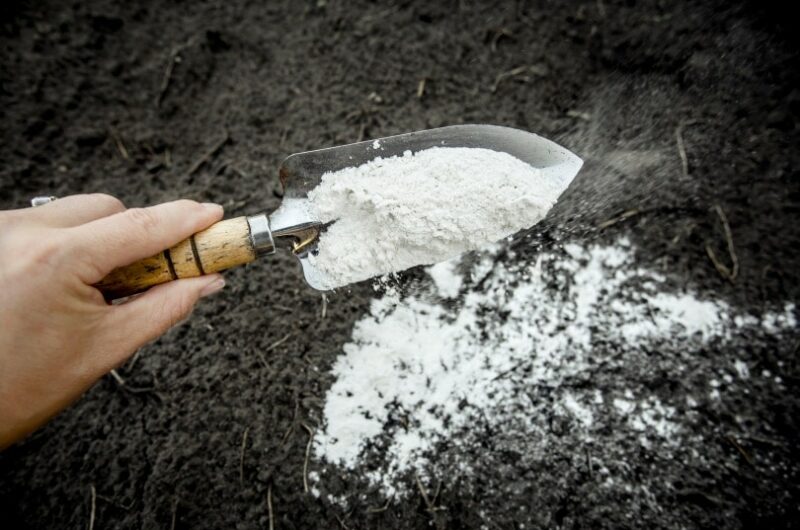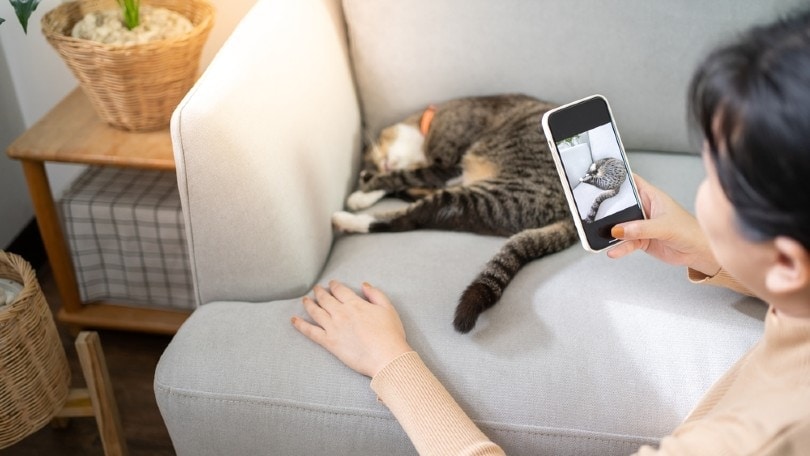Will Aluminum Foil Keep My Cats Off the Counters? Facts & Alternatives
Updated on
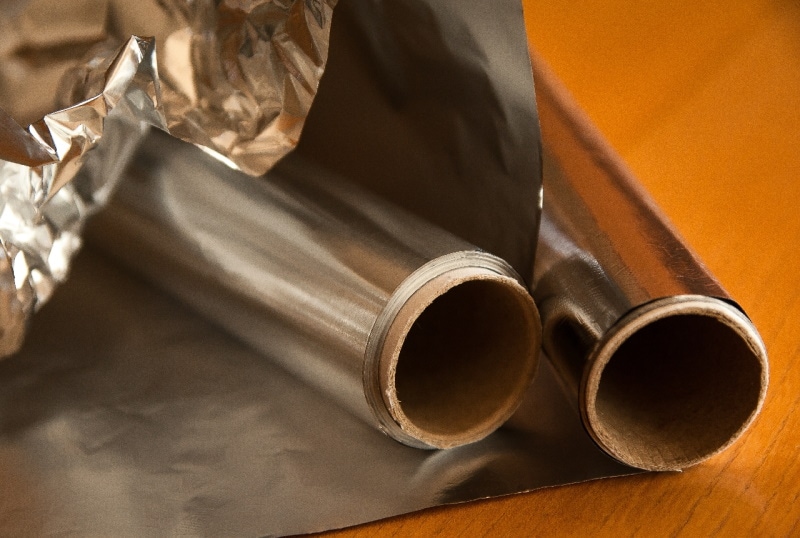
Will aluminum foil keep your cats off the counters in your kitchen? The answer is yes, maybe, and no, as the efficacy of aluminum as a deterrent depends on the individual cat. Some will flee in terror, while others will shrug and continue with their normal cat business. Curious to find out more? If so, read on.
Cats are the Epitome of Curiosity
As cat fanciers know, cats are curious animals that will go wherever they please without much care about what their pet parents think. That includes the counters in your kitchen, where cats will gladly roam unless you do something to prevent or stop them. But stop them, you should, because dirty cat feet and cat fur do not belong on the same countertops where you prepare food and cook meals.
Aluminum Does Work (Sometimes)
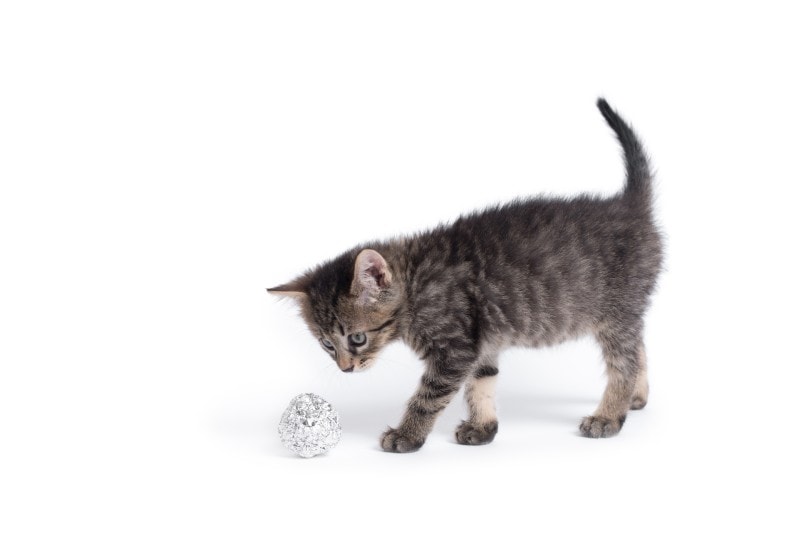
The challenge of keeping your cats off the counters is not easy, to be sure, but one solution that’s become popular of late is to use aluminum foil. YouTube has dozens of videos of cats fleeing in panic from aluminum placed on countertops. These videos seem to prove that it works, but if you dig deeper, the truth, as they say, gets a little fuzzier. Will aluminum foil keep your cats off the counters? Sometimes it will, but sometimes it won’t; it depends on the cat.
Why Are Some Cats Scared of Aluminum?
Why aluminum works as a deterrent to cats walking on your kitchen counters is simple; cats have no idea what it is. There’s nothing that looks, feels, and sounds like aluminum foil in the wild, not even close.
1. Aluminum Foil Is Shiny and Reflective
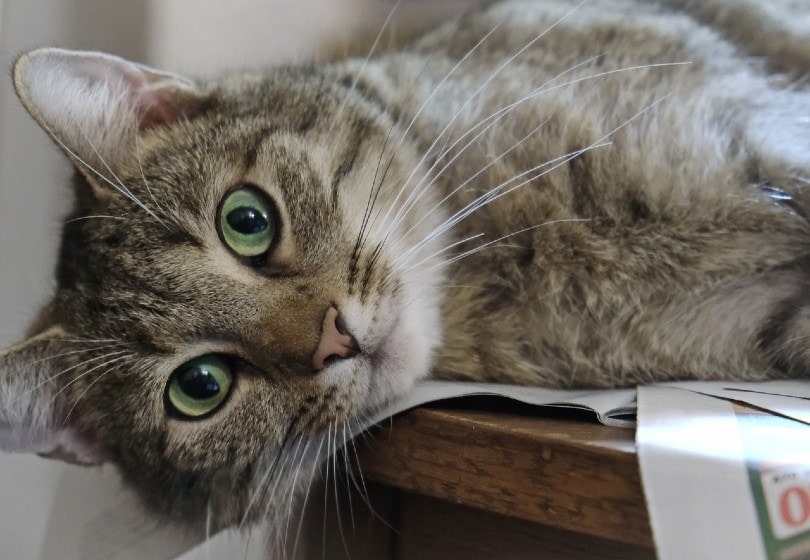
Aluminum foil is shiny, like a mirror, creating a reflection that can sometimes scare a cat. Some cats will see themselves and think it’s another cat, which is jolting. Other cats will see something that looks like water when they look at aluminum foil. Because it looks like water, your cat will steer clear of aluminum because cats aren’t big fans of H2O.
2. Aluminum Foil Feels Odd Under your Cat’s Feet
Besides being reflective, aluminum foil has a weird feel under your cat’s paws that they’ve never encountered, and it moves in weird ways when they step on it. Some homeowners with cats crinkle the aluminum before placing it on the counter, creating a texture that cats truly don’t enjoy under their feet.
3. The Noise Aluminum Makes Is Terrifying to some Cats

The most jarring aspect of aluminum for most cats is the noise it makes when stepped on, which is unlike any noise made in nature. In fact, the crinkling of aluminum foil is incredibly high-pitched and can create ultrasonic sounds. You can’t hear it, but your cat sure can, and the noise can shock their system if they’ve never heard it before. Plus, cats hate high-pitched noises because they have very acute hearing. The noise made by crinkling aluminum is thus something most cats will not enjoy in the least.
4. Cats Live by Their Fight or Flight Reflexes
One last reason some cats are frightened of aluminum is that they’re programmed to be after millennia of learning to run from things that might harm them. It’s called their “fight or flight reflex,” an instinct that cats and many other animals have that helps them stay alive. When your cat encounters aluminum, especially the first time, the sensory overload it causes clicks their fight-or-flight reflex into high gear, and they take off.
Most Cats Eventually Get Used to Aluminum Foil
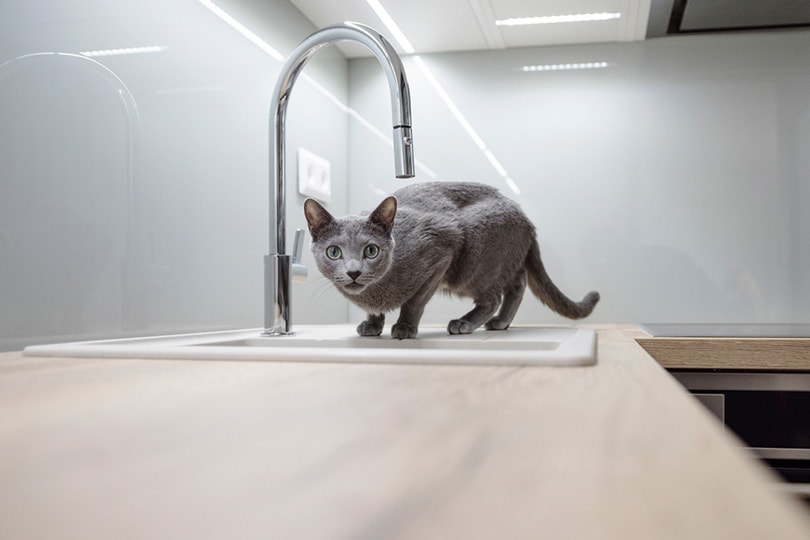
One reason we’ve been hedging our bets about aluminum foil’s effectiveness in keeping cats off counters is that, as you likely know, cats are smart animals. Sure, the first, and maybe even the second and third, time your cat sees, hears, and feels aluminum foil, they’ll be alarmed, but most cats will eventually get used to aluminum.
Eventually, most cats will ignore aluminum foil, whether it’s on the counter or wrapped around a lasagna pan. Aluminum foil might keep your cat off your counters, but it will likely be a short-term solution that will eventually no longer work.
Alternatives to Aluminum Foil
Knowing that aluminum foil is only a short-term solution to keep your cats off your kitchen counters, you might be wondering about other methods that can keep your pet away from restricted areas. You’ll find some of the best below.
1. Double-sided Tape
Cats are very finicky, especially regarding what they touch with their paws. Anything sticky is a big no-no for cats, which makes double-sided tape a good solution for keeping them off your counters. To use it successfully, buy some heavy-duty double-sided tape from your local big-box retailer. Then, place the tape on the edges of your counters. When your cat jumps up, it’ll encounter the stickiness of the tape and, usually, jump right back off.
One drawback to double-sided tape is that, like aluminum foil, your cat will likely get used to it. Even if they stay away, you’ll need to remove and replace the tape often, which is rather wasteful. Also, everything sticks to double-sided tape, and eventually, it will become really nasty with bits of food, crumbs, cat fur, dust, etc.
2. Spray Them with Water
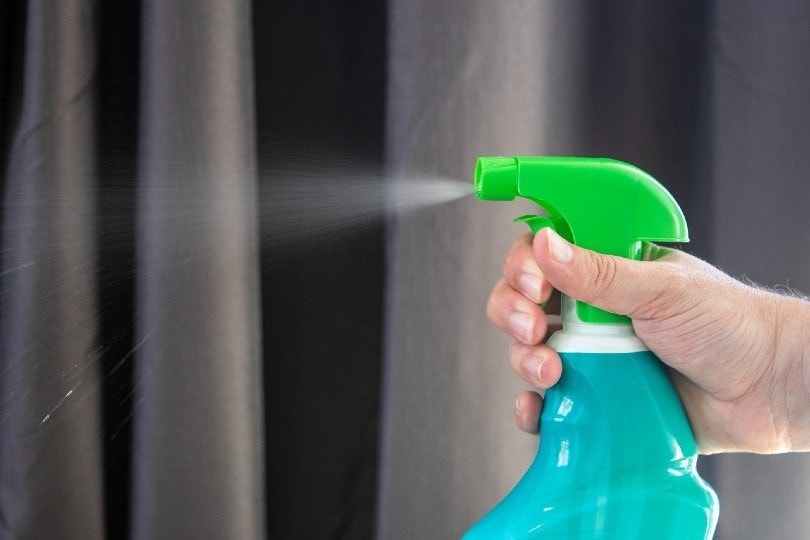
Cats aren’t big fans of getting wet. While it’s a bit controversial, using a spray bottle filled with water to keep cats off the counter has been shown to work. It’s easy, too. All you do is fill a spray bottle with water and, when your cat jumps on the counter, give them a quick spritz. After one or two spritzes, your cat will get the hint and stay off the counters. Make sure to keep the bottle out and visible until you’re sure your cat no longer goes on the countertops. Also, don’t overdo it with the spray, as your cat might get very upset with you and become destructive or depressed.
3. Give Your Cat an Alternative
Cats jump onto countertops to explore, look around and, in many cases, use a window to look outside, especially if they’re indoor cats. Giving your cat an alternative to your counters is often an effective solution to keeping them off. For example, a carpet-covered shelf in front of a window with a view of your yard might be just the thing your cat needs to steer clear of your kitchen counters. A cat tree also works well.
4. Keep Food Off of Your Counters
One big reason cats jump on counters is that they smell food that’s been left there, even if just for a few moments. Keeping food off the counter and in your fridge or pantry is ideal. Plus, since cats are known to knock things off counters, putting food away will save you from countless messes you’ll need to clean up off the floor.
5. Use Plastic Wrap
Like aluminum foil, plastic wrap freaks a lot of cats out and will keep them off your counters, at least for a short time. Also, like aluminum foil, most cats will get used to the plastic and eventually walk over it or otherwise ignore it.
Final Thoughts
Yes, it will probably keep them off the first few times you put aluminum foil on your countertops, but most cats will quickly become accustomed to its sight, sound, and feel and will jump on the counters, nonetheless. In short, aluminum foil will keep your cats off your counters, but probably not for long.
Hopefully, you now have all the answers you were searching for and have a better idea of which solutions are available to keep your cats off your counters (and keep their dirty little paws away from your food). Best of luck figuring out the best way to keep your cats off the counters and to a harmonious relationship with your feline friends.
See also:



